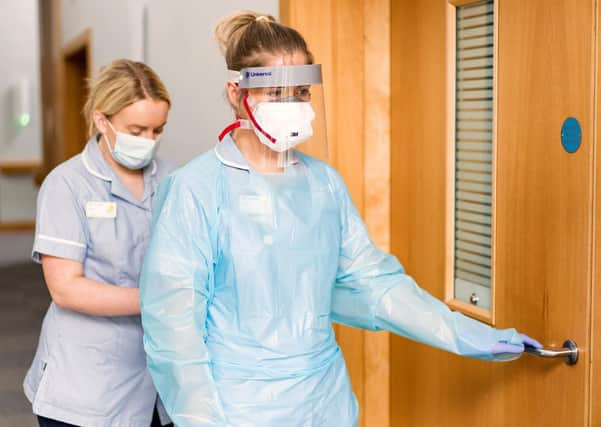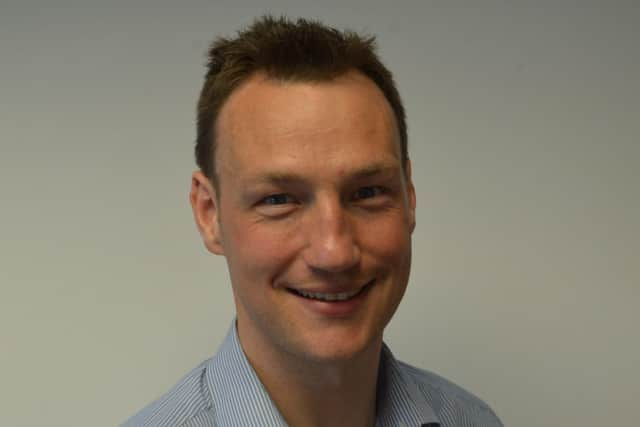How Marie Curie has kept on caring for terminally ill throughout crisis – Richard Meade


Like so many sectors, palliative care was hit hard by the coronavirus pandemic, and the third sector in particular, but it was clear from the beginning that the sector had a vital role to play. Not only were people dying of Covid-19, but people continued to die of other diseases too, and in much higher numbers than normal.
Being on the frontline of the crisis at Marie Curie we faced unprecedent challenges, but had to find a way to continue to provide care and support to people with coronavirus as well as dying people and families living with any terminal illness.
Advertisement
Hide AdAdvertisement
Hide AdInnovation and change became daily, almost hourly occurrences, and led to many new ways of working. A new Palliative Care Hub in Glasgow was set up integrating services across all settings including Marie Curie. We expanded our community palliative care services to seven-day operations, increased the hours of our support telephone line and introduced new bereavement telephone support. In the Lothians, we established a new Rapid Response service enabling urgent home assessment and intervention to support unstable patients on the same day as referral. We started providing nursing and medical advice to the local Community Hospital Covid ward in Midlothian to support the staff delivering care at the end of life.


Greater partnership working and eagerness to collaborate, problem solve and share experiences also became the norm. Responsiveness of external agencies and others to requests for help, knowledge and advice was excellent.
We did have to pause some services that required people to attend our hospices in person, but our support didn’t stop as we turned to virtual and digital solutions. We have been supporting people with a mixture of video consultations (NHS Near Me), telephone calls and home visits.
One of the hardest and most emotional challenges we have faced during this time was managing visits of relatives and friends to inpatients in our hospices. We always did our best to enable family, with adequate PPE, to visit loved ones at the end of life, and no one has died alone.
However, the restrictions and suspension of normal visiting clearly had an impact on families and our staff. It meant that some patients opted to be discharged so that they could be with their families, despite their complex and unstable health. Where possible we continued to provide support at home. Our volunteer-led Helper service stopped face-to-face visits, but have been continuing to offer virtual support by phone, FaceTime, sending them cards, as well as signposting them on to other organisations that can provide practical help and support as they needed it.
The service has continued to take on new referrals and we have seen an increase in people needing support as family or day therapy support wasn’t possible. Many of these people were feeling lonely and isolated.
There have been many key learnings from the last three months which will inform and influence future practice in support of another wave of cases and with future practice.
We will continue to face very real challenges to our fundraising efforts and we know that statutory partners will equally face challenges with resource. The health and social care system will need to recover, but the demand from our communities for support and care is likely to grow, not recede with the epidemic.
Advertisement
Hide AdAdvertisement
Hide AdTerminally-ill people, their families and carers will still need support and we need to ensure that we retain those innovations that have improved how we support people, but we must go further. To do this we will require everyone, health and social care, the third and independent sectors, as well as the community. We need to see a whole system approach with a focus on improving the experience people get at the end of life.
This will require even greater collaboration, sharing of resources, mobilising of community assets and most importantly brave leadership to drive progress. Only by doing this can we ensure that everyone who is terminally ill and approaching the end of life get the care and support they need.
Anyone looking for information about all aspects of end of life or grieving, whether you have practical, emotional or financial questions or concerns, or if you just want someone to talk to, can contact the Marie Curie Information and Support line (0800 090 2309 or visit mariecurie.org.uk/support
Richard Meade is head of policy and public affairs Scotland at Marie Curie
Comments
Want to join the conversation? Please or to comment on this article.